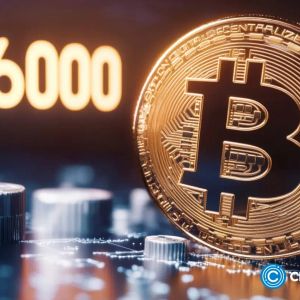2024-12-16 00:22:54
Japan’s government is currently pushing for an “active cyber defense” (ACD) policy, and major media in the country are falling all over themselves to aid in the effort with stories to alarm the public. However, copying the examples of the US and UK, as major outlet Nikkei implies ought to be done, is in the very worst interest of peaceful crypto and privacy advocates in Japan. Not long ago, Cryptopolitan reported on Masaaki Taira, Japan’s digital transformation (DX) minister, being commanded by self-described “defense geek” prime minister Ishiba to accelerate work on an “active cyber defense” (ACD) bill. The bill is controversial because it involves state-level spying via private telecom companies on the people of Japan, even in peacetime, and supplying the info to the United States. Some Japanese are also suspicious of scandal-embroiled Taira potentially having connections with anti-Japan interests in the Chinese Communist Party. Major news outlet Nikkei has now joined the push for the “active cyber defense” agenda, publishing a report (or propaganda piece, depending on who you ask) promoting greater cyber-attack preparedness. The December 16 report goes so far as to imply that centralized misinformation control and even state-level “debunking” need to be increased, and done in tandem with major nations like the US and UK. But mimicking Five Eyes intelligence giants in surveillance is a horrible idea for cryptocurrency adoption and privacy in Japan, especially with a digital yen now on the table. The combined effect of all this is to threaten the culturally self-reliant populace with even more influence from a global banking cabal, and pressure to align with cartoonish foreign figures like Musk and Trump , whose actions Taira wants to “closely follow.” Of course Nikkei knows this. And of course the new prime minister Shigeru Ishiba doesn’t actually care about the security or economic freedom of the people he supposedly governs. But nor does any politician, really. This should go without saying. Nikkei shills for surveillance, Japan falls further from crypto grace While the years of independent bitcoin ATMs in Tokyo (ca. 2015-2017) operating free and unfettered are far behind us, and popular trading sites like Local Bitcoins have long since been destroyed by the same restrictive red tape that took out the ATMs, things yet continue to spiral downward when it comes to the Japanese government’s approach to finance, cryptocurrency, and information control. And the media is right there behind them, fueling the fire. “Cyber attacks are posing increasing threats to national security,” the new Nikkei report (translated by Google) reads. “Attacks on governments and military-related targets in various countries have increased by more than 70% compared to the same period last year.” The piece continues: “Japan is currently aiming to strengthen its cyber security system, including the introduction of ‘active cyber defense (ACD)’ that detects signs of cyber attacks and prevents damage before they occur.” As mentioned above, the ACD bill aims to spy on public communications via private companies ostensibly to stave off cyber attacks and the spread of misinformation before they happen. According to other reports from local media, the new legislation could even include shutting down people’s computers. The terms “thoughtcrime” and “pre-crime” might pop into the heads of readers and film buffs familiar with the horrific dystopias of 1984 and The Minority Report. Japan’s NISC, responsible for issuing cybersecurity warnings, issued far less alerts than its foreign counterparts in England (middle) and the United States (top), according to Nikkei’s research. Source: Nikkei Combine all this with the looming CBDC , (read: centrally programmed, censorable digital JPY) also shilled/predictively programmed by Nikkei interests, and a pretty clear picture of what is happening emerges: Japanese state officials are painting themselves as the victims, while clamping down even harder on the true victims — everyday folks just trying to get by. Crypto is taxed at insanely high rates in Japan (up to 55% on gains), and increasing regulation of the cryptocurrency and banking industries in the nation is making it near impossible for individuals and small businesses to leverage the true benefits of peer-to-peer digital currency — that is, without facing potential jail time. It’s now common in Japan for even normal bank accounts to unilaterally freeze customer funds if the smallest abnormality or “suspicious behavior” is detected with a deposit or transfer. Further, Japan’s financial regulator, the FSA, is in closed door talks about how to more effectively capture the asset class. Debunking the need for government debunking The Nikkei report notes that Japan’s NISC (National Center of Incident Readiness and Strategy for Cybersecurity), responsible for issuing cybersecurity warnings to the public, lags far behind its foreign counterparts in Britain and the US. But in Japan, perhaps worrying about the inflation problem , the rampant overtourism, and suicides from overwork might be good to put on the agenda, as opposed to Shigeru Ishiba’s plans for military spending on steroids and drafting of cyber-security bills that spy on everyone. Perhaps instead of lending military support and money to the United States/Israel genocide in the Middle East, politicians on the archipelago might start worrying about the aging population of retirees unable to survive on the national pension. But alas, that is wishful thinking. Which is why permissionless cryptocurrencies became so important in the first place. The report compares the number of “debunkings” Japanese embassies have issued on X, compared to other embassies. Source: Nikkei As if to insultingly answer these ponderings with a non-sequitur, however, the Nikkei report reads: “The Nikkei Shimbun compiled the number of debunkings from April 2011 to July this year for the X (formerly Twitter) accounts of the Japanese, US and UK embassies … the Japanese embassies in the US and UK only sent out one debunking each from their respective countries … that denied the danger of treated water from the Fukushima Daiichi Nuclear Power Plant.” Nikkei’s report then lauds the intelligence giants overseas: “On the other hand, the US embassy in Japan sent out 13 debunkings, and the UK embassy sent out 10.” Is this really a litmus for social progress? Which government sends out the most “debunkings”? I don’t personally think so. A litmus for social progress is how much economic freedom an individual has, and the respect of others for that freedom. On that front, the Japanese government, and those of the whole world, are miserably and intentionally failing. So, if dystopian spying and “pre-crime” cybersecurity bills are what Japan is lagging behind in, perhaps that particular lack of ambition is for the best. Land a High-Paying Web3 Job in 90 Days: The Ultimate Roadmap











